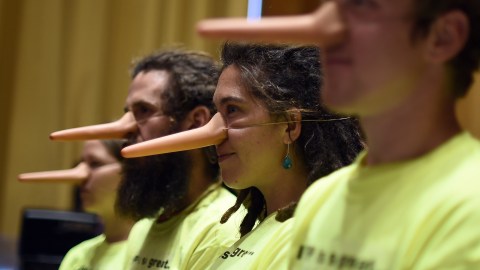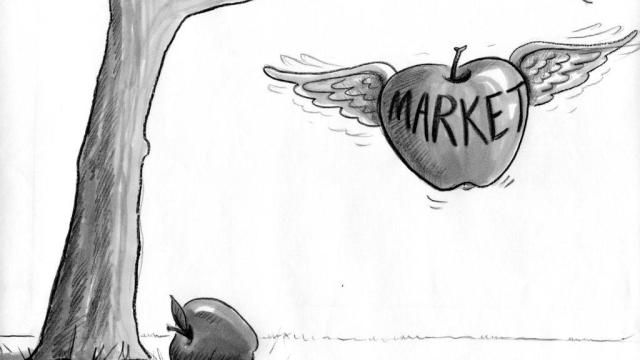Three good reasons to tell a lie

Photo credit should read JEWEL SAMAD / AFP / Getty Images
A few weeks ago, I heard Sam Harris on the radio pitching his new book, Lying, and found myself with furrowed brow over his absolutist stance against telling tales. Is it true that “we can radically simplify our lives and improve society by merely telling the truth in situations where others often lie”? Should we consider white lies as verboten as whoppers? Is fibbing to make someone feel better as morally outrageous as lying to the world about a sexting affair or a bridge scandal?
Harris makes a thoughtful case for rethinking our casual embrace of the casual lie. “Seemingly tiny lies,” he wrote, “can damage trust” between individuals and thus, on a larger scale, “corrode society.” When we lie, Harris tells us, we are misleading people about the world and could hurt them in ways we don’t immediately understand. And by failing to deal honestly with people all of the time, we set up barriers between us and people we love. Lying stresses us out. We have to remember not only reality as we know it but distorted reality as we have painted it for others. This taxes our interpersonal lives and often snowballs into the need to create an intricate web of lies to support the initial fib. That’s no fun. It’s also risky: if our lie is exposed, it is very difficult to build back trust. This is why adultery so often destroys marriages.
As a new fan of the Netflix series House of Cards, I find Harris’s red line against deception curious. You don’t have to admire the two-faced, manipulative characters on the show to find a smidgen of yourself in there somewhere. And you don’t have to be a Machiavellian to see some truth in Machiavelli’s dictum that success requires exercising a little cunning. If you forswear playing the fox, you will eventually get played for the fool.
Yet Harris, doe-eyed and staring straight into the camera, tells us he recalls lying to his five-year-old daughter “only once”:
We were looking for nursery rhymes on the Internet and landed on a page that showed a 16th-century woodcut of a person being decapitated. As I was hurriedly scrolling elsewhere, she demanded to know what we had just seen. I said something silly like “That was an old and very impractical form of surgery.” This left her suitably perplexed, and she remains unaware of man’s inhumanity to man to this day. However, I doubt that even this lie was necessary. I just wasn’t thinking very fast on my feet.
This little example, this momentary, singular slip, serves to establish Harris as nearly as human as the rest of us. Even moral absolutists can err, he implies, but they can mend their ways. But is there anything to mend here? What exactly is wrong with the way Harris responded to his daughter’s question? His anecdote illustrates one good reason to lie: to protect the innocence of very young children. I am not arguing parents should present the world as all sugarplums and fairy dust. My claim is that there’s no good reason to explain the details of fundamentalist religious terrorism to a three-year-old, or medieval torture to a four-year-old. When my daughters were three and four and we arrived on this page of Madeline and the Bad Hat, the question inevitably arose: what’s that thing?

I explained away the guillotine as a device for chopping onions. And I felt no compunction about telling the lie.
Some time later (months? a year?), once the girls were fully aware that real-life dead chickens are an essential ingredient in chicken soup, I disclosed that the guillotine was actually used to chop off the chickens’ heads. They gulped but didn’t freak out. And, most notably, they didn’t seem horrified or insulted that I had withheld this information from them. A little later, I went a step further and explained that guillotines were not designed only, or primarily, for chickens. . .
I think my girls understood that as they became more mature they were able to handle more information about this neck-slicing apparatus without bursting into tears. I think they appreciated, quietly but surely, that I didn’t spill all the beans when they were wee.
Clancy Martin, reviewing Lying in Bookforum, details another type of deception that should be removed from Harris’s chopping block. He quotes Nietzsche:
But even if this all were true and I were accused of it with good reason, what do you know, what could you know about the amount of self-preserving cunning, or reason and higher protection that is contained in such self-deception—and how much falseness I still require so that I may keep permitting myself the luxury of my truthfulness? Enough, I am still alive; and life has not been devised by morality: it wants deception, it lives on deception.
Nobody should aspire to living a lie, but a life without some self-deception would be hard to navigate. We fool ourselves into doing a lot of difficult and painful and expensive but good and worthy things, from running marathons to having children to going to graduate school. Doing truth-laid-bare cost-benefit analyses of every decision we face is no way to confront the challenges of life.
So this post gives you two good reasons to tell a lie. I admit I’ve deceived you. I don’t have a third. There was just something about the headline “Two Good Reasons to Tell a Lie” that seemed a little lacking.





